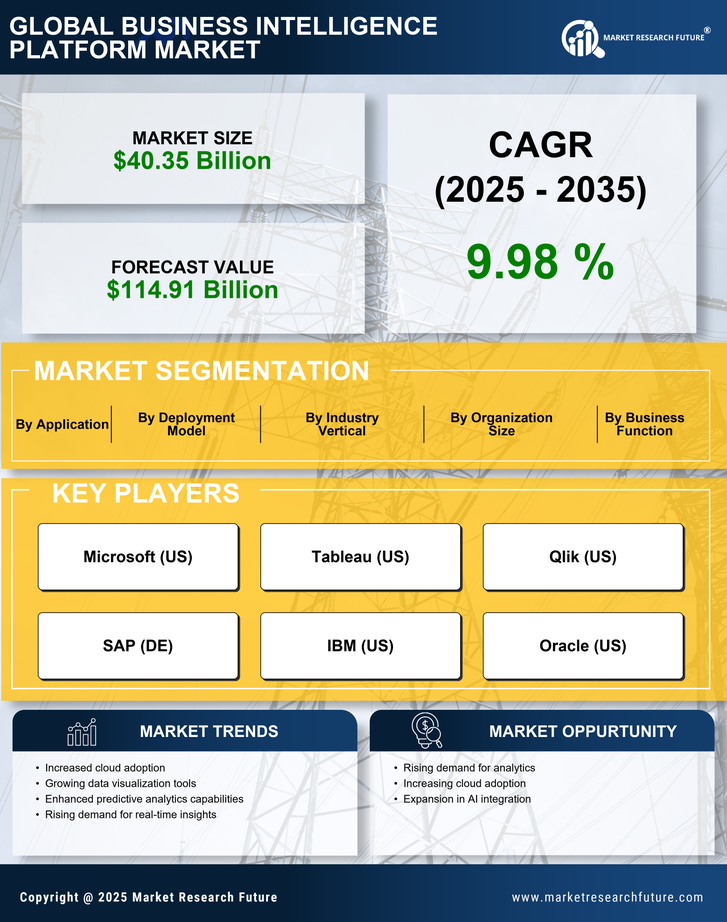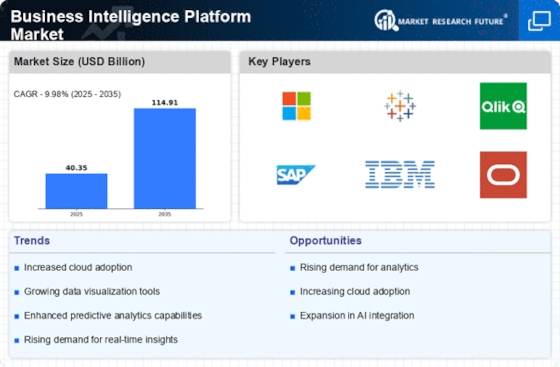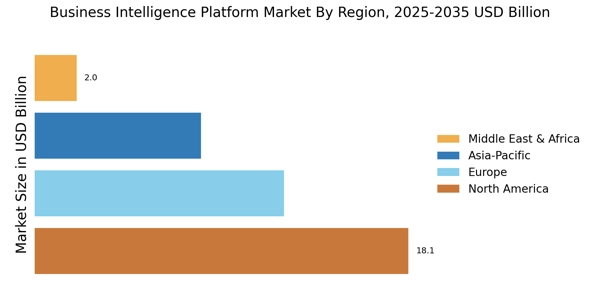Rise of Big Data Technologies
The Business Intelligence Platform Market is significantly influenced by the rise of big data technologies. As organizations generate and collect vast amounts of data, the need for sophisticated analytics tools becomes increasingly critical. The integration of big data technologies with business intelligence platforms enables organizations to process and analyze large datasets efficiently. This synergy is expected to drive market growth, as businesses seek to extract actionable insights from their data. Recent reports indicate that the big data analytics market is anticipated to reach USD 68 billion by 2025, which underscores the potential for business intelligence platforms to capitalize on this trend. By leveraging big data technologies, organizations can enhance their decision-making processes, leading to improved operational performance and customer satisfaction.
Emergence of Self-Service BI Tools
The Business Intelligence Platform Market is experiencing a shift towards self-service business intelligence (BI) tools, which empower users to analyze data without relying heavily on IT departments. This democratization of data access allows employees across various levels to generate insights and reports independently. The self-service BI market is projected to grow significantly, with estimates suggesting a market size of USD 10 billion by 2025. This trend is indicative of a broader movement towards agility and responsiveness in decision-making processes. Organizations are increasingly adopting self-service BI tools to foster a data-driven culture, enabling faster and more informed decisions. As a result, the rise of self-service BI tools is likely to be a key driver in the growth of the business intelligence platform market.
Increased Focus on Data Visualization
The Business Intelligence Platform Market is witnessing an increased focus on data visualization as organizations strive to present complex data in an easily digestible format. Effective data visualization tools enable users to interpret data quickly and make informed decisions. This trend is particularly relevant in industries such as finance, healthcare, and retail, where timely insights are crucial. The market for data visualization tools is projected to grow at a compound annual growth rate of 12% over the next five years, indicating a robust demand for business intelligence platforms that offer advanced visualization capabilities. As organizations prioritize user-friendly interfaces and interactive dashboards, the emphasis on data visualization is likely to drive the adoption of business intelligence solutions, enhancing overall data comprehension and strategic planning.
Growing Demand for Data-Driven Decision Making
The Business Intelligence Platform Market is experiencing a notable surge in demand for data-driven decision making. Organizations are increasingly recognizing the value of leveraging data analytics to enhance operational efficiency and strategic planning. According to recent estimates, the market for business intelligence solutions is projected to reach USD 30 billion by 2026, reflecting a compound annual growth rate of approximately 10%. This trend is driven by the need for organizations to remain competitive in a rapidly evolving landscape, where data insights can provide a significant edge. As businesses strive to optimize their processes and improve customer experiences, the adoption of business intelligence platforms becomes essential. Consequently, this growing demand is likely to propel the market forward, as companies invest in advanced analytics tools to harness the power of their data.
Integration of Advanced Analytics Capabilities
The Business Intelligence Platform Market is being propelled by the integration of advanced analytics capabilities, such as predictive and prescriptive analytics. These capabilities allow organizations to not only analyze historical data but also forecast future trends and recommend actions. The demand for advanced analytics is on the rise, with the market expected to reach USD 20 billion by 2026. This growth is driven by the need for organizations to enhance their strategic planning and operational efficiency. By incorporating advanced analytics into business intelligence platforms, organizations can gain deeper insights into customer behavior, market trends, and operational performance. Consequently, the integration of these capabilities is likely to play a pivotal role in shaping the future of the business intelligence platform market.


















